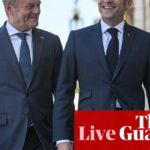Trump says he believes Putin ‘wants peace’ with Ukraine
Here’s more on Donald Trump’s remarks to reporters from the Oval Office, during which he said he believes that Russian president Vladimir Putin “wants peace” with Ukraine.
“I believe he wants peace,” Trump said.
I believe President Putin when I spoke to him yesterday. I know him very well. I think he wants peace. I think he would tell me if he didn’t.
“I trust him on this subject. I think he’d like to see something happen,” Trump added.
Key events
-
Summary of the day
-
Trump says he would ‘love to have Russia back’ in G7
-
Trump says he believes Putin ‘wants peace’ with Ukraine
-
Ukraine, Europe and US must be ‘fully united’ in peace talks, says Poland’s Tusk
-
The day so far – summary
-
Don’t trust Putin’s claim he is ready to end war, Zelenskyy says, as he calls for a united Ukraine, EU, US position for talks
-
First details of peace talks emerge from Russia
-
No ‘inevitable desire to clash with China,’ Hegseth says
-
Peace talks will be with both Putin and Zelenskyy, Hegseth says
-
Hegseth says all options on table for talks, but accepting reality is not making concessions
-
Hegseth rejects suggestions of early concessions to Putin
-
Trump will not allow anyone to ‘turn Uncle Sam into Uncle Sucker’, Hegseth says
-
‘We must make Nato great again,’ US defence secretary Hegseth says
-
You can’t shoot values and speeches, you need hard power, US Hegseth tells European allies
-
US defence secretary Hegseth speaks after Nato meeting
-
Ukraine was never promised Nato membership to come as part of peace deal, Rutte says
-
‘We are intensely consulting with the US,’ Nato’s Rutte says
-
Talks won’t last one day and we need to be sure outcome can be sustained, Rutte says
-
Rutte says Europe, Canada will take ‘greater proportion’ of Nato burden
-
‘We need to put Ukraine in the best possible position,’ Nato’s Rutte says
-
‘Shock and sadness’ in reaction to Munich attack, Nato’s Rutte says
-
‘Not very pleasant’ that Trump spoke to Putin first, Zelenskyy says
-
We must pressure Russia into negotiations, not Ukraine, Estonian PM says
-
Munich suspect arrived to Germany as unaccompanied minor – media
-
What do we know about Munich attack so far?
-
Suspect had his asylum application rejected, but could not be deported, state minister says
-
‘We must use everything in our means’ against perpetrator, chancellor Scholz says
-
‘Something must change in Germany,’ opposition leader Merz says
-
‘Senseless act’ of violence, vice chancellor Robert Habeck says
-
‘Will it go on like this for ever?,’ far-right AfD leader asks after Munich attack
-
Officers fired shot at vehicle during arrest, police confirm
-
We cannot show concern but ‘must actually change something,’ Bavarian premier says
-
What we know about Munich car ramming attack – summary
-
Munich car ramming suspect a 24-year-old Afghan asylum seeker; 27 injured, authorities say
-
‘We are continuing, we are strong’, Ukrainian defence minister says
-
Nato secretary general Rutte, Ukrainian defence minister Umierov to speak
-
Two seriously injured, Munich police confirm
-
‘Get into deal-making mode,’ ex MI6 chief says
-
Ukraine’s will must be central to any peace deal, EU justice commissioner says
-
Talks on Ukraine must include Kyiv, Ukrainian foreign minister says
-
Around 2o people injured in Munich, police confirm
-
Munich incident – what we do and don’t know
-
German police calls for witnesses
-
Munich driver detained, poses no further threat, police says
-
‘Several people injured’ after car driven into crowds in Munich, police says
-
‘No dictated peace’ for Ukraine, German prime minister Scholz says
-
Belarus frees three detainees including US citizen and journalist
-
‘No doubt’ kiss Luis Rubiales gave Jenni Hermoso was not consensual, court told
-
12 injured after grenade was thrown into bar in France
-
Trump’s talks with Putin like ’19th-century concert of powers,’ Polish Europe minister says
-
No ‘peace through weakness,’ French minister warns
-
Would have been better if US had not given concessions before talks started, German defence minister says
-
We need ‘a just and durable peace,’ Canada’s defence minister says
-
Ukrainians are the frontline of freedom, UK defence minister says
-
‘Clear convergence’ on peace in Ukraine, Rutte says
-
Peace push ‘not a betrayal’ of Ukraine, US defence secretary Hegseth insists, saying Russian aggression was a ‘factory reset’ for Nato
-
Morning opening: What’s next for Europe?
Summary of the day

Léonie Chao-Fong
It’s nearly midnight in Kyiv, 1pm in Moscow and 5pm in Washington. Here’s a recap of the latest developments:
-
Ukrainian president Volodymyr Zelenskyy warned world leaders “against trusting [Vladimir] Putin’s claims of readiness to end the war”. He called for the US to agree a “plan to stop Putin” before any negotiations, a day after Trump said he and the Russian leader had agreed to begin negotiations to broker a ceasefire in Ukraine.
-
US president Donald Trump insisted he believed Putin “wants peace”. “I think he would tell me if he didn’t,” Trump said on Thursday, adding that Ukraine will be “part of” negotiations. Trump also said he would “love” to see Russia return to the G7.
-
Trump’s defense secretary Pete Hegseth said “everything is on the table” to bring peace to Ukraine, and insisted the US had not already given too much away when he had said on Wednesday that Ukraine could not restore its pre-2014 borders.
-
The Kremlin said plans were under way for Putin and Trump to meet, possibly in Saudi Arabia. Ukraine would be in “one way or another” involved in talks, it said, but there would also be a “bilateral Russian-American track”.
-
Trump’s announcement on Wednesday stunned Ukraine and European allies. Zelenskyy, who also spoke to Trump on Wednesday, said it was “not very pleasant” that Trump called Putin before calling him.
-
Nato secretary general Mark Rutte said any peace deal in Ukraine must be enduring and that any discussions must include Kyiv. “It is crucial that whatever comes out of those talks, it is durable, it is enduring,” Rutte told reporters in Brussels ahead of talks with the alliance’s defence ministers.
-
German chancellor Olaf Scholz rejected any “dictated peace”, arguing that “a Russian victory or a Ukrainian collapse will not lead to peace – on the contrary”. “This would put peace and stability in Europe at risk, far beyond Ukraine,” he said.
-
The EU’s top diplomat Kaja Kallas accused Washington of “appeasement” towards Russia, insisting that no deal “behind our backs” could work. “You need the Europeans, you need the Ukrainians, she said. “Any quick fix is a dirty deal.”
-
At least 30 people were injured after a24-year-old Afghan asylum seeker drove a car into a trade union demonstration in Munich, German police have said, in a suspected attack that is expected to inflame tensions before this month’s election.
Away from the Ukraine war, the US has just announced it has released a Russian cybercriminal as part of an exchange that saw an American schoolteacher freed from Russian prison earlier this week.
The Trump administration has released Alexander Vinnik, a cybercriminal who pleaded guilty to conspiracy to commit money-laundering, to Russia, after Moscow released Marc Fogel on Tuesday.
Vinnik, who arrived in Moscow on a flight from Turkey on Tuesday after having been released from custody in California, is accused of owning and operating one of the largest cryptocurrency exchanges in the world, BTC-e, which prosecutors allege facilitated the transfer of billions of dollars in transactions for criminals worldwide.

Jessica Elgot
In the UK, prime minister Keir Starmer’s Labour government has been at pains to keep Donald Trump’s on side. But the US president’s call with Russia’s Vladimir Putin has left UK ministers and officials doing some extraordinary contortions not to provoke Trump’s ire, writes the Guardian’s Jessica Elgot.
Here’s more from her analysis:
There is no greater priority in the UK’s foreign policy than keeping the volatile occupant of the White House on side. And that has meant over the past 24 hours that some pronouncements by the British government have seemed at odds with reality.
In the real world, we have just seen the US president make extraordinary concessions in a call with the Russian president – no return to pre-2014 borders and a dismissal of Ukraine’s hopes of joining Nato.
The response by British ministers is then to say that of course Trump is right to want peace in Ukraine, but the priority is “putting Ukraine in the strongest possible position”.
That makes very little sense just hours after Ukraine’s position was so undermined by Trump’s decision to engage with Putin directly on the terms of a possible peace deal.
Keir Starmer’s spokesperson said there could be “no negotiation about Ukraine without Ukraine”. But that is what the US president has just done.
Marco Rubio, the US secretary of state, told Ukraine “bold diplomacy” was needed to end the war with Russia.
Reuters reports Rubio spoke to Ukraine’s foreign minister Andrii Sybiha. In a statement about the call, the state department said: “They discussed the need for bold diplomacy to end the war in a negotiated manner leading to a sustainable peace.”
Trump says he would ‘love to have Russia back’ in G7
US president Donald Trump said he would “love” to see Russia return to the Group of Seven (G7) nations.
“I’d love to have them back,” Trump told reporters in the Oval Office.
I think it was a mistake to throw them out. It’s not a question of liking Russia or not liking Russia. It was the G8.
Russia was removed from the group, then known as G8, in 2014 after Moscow annexed Ukraine’s Crimea peninsula. He added:
I said, ‘What are you doing? You guys – all you’re talking about is Russia and they should be sitting at the table.’ I think [Vladimir] Putin would love to be back.
US president Donald Trump said Ukraine would be “part of” any peace negotiations with Russia over ending the war.
“The Ukraine war has to end,” Trump told reporters in the Oval Office.
Young people are being killed at levels that nobody’s seen since World War Two, and it’s a ridiculous war. It has to end.
Trump says he believes Putin ‘wants peace’ with Ukraine
Here’s more on Donald Trump’s remarks to reporters from the Oval Office, during which he said he believes that Russian president Vladimir Putin “wants peace” with Ukraine.
“I believe he wants peace,” Trump said.
I believe President Putin when I spoke to him yesterday. I know him very well. I think he wants peace. I think he would tell me if he didn’t.
“I trust him on this subject. I think he’d like to see something happen,” Trump added.
US president Donald Trump has reportedly said that he trusts that Russian leader Vladimir Putin “wants peace” with Ukraine.
“I think he would tell me if he didn’t,” Trump told reporters a day after he held separate calls with Putin and Ukrainian president Volodymyr Zelenskyy, according to Agence-France-Presse.
Ukraine would have a seat at the table during any peace negotiations with Russia over ending the war, Trump added, according to Reuters.
Ukrainian president Volodymyr Zelenskyy praised a “good result” on the front line of Ukraine’s war against Russia, but provided no details or location.
Zelenskyy, in his nightly video address, acknowledged the actions of the 425th separate assault regiment, appearing to indicate the action had taken place near the frontline city of Pokrovsk.
“There is a good result,” he said.
It would be improper to describe the geography. I won’t make this political, but I want to congratulate the 425th separate assault regiment. Your strength clearly has meaning. Well done!
The first thing Olena Litovchenko thought, when she read the news of Donald Trump’s phone call to Vladimir Putin on Wednesday evening, was that it might finally be time for her to leave Ukraine.
“It feels like Ukraine is being screwed,” said Litovchenko, a personal trainer who was born in Kyiv and has stayed in the city throughout the three years of full-scale war.
Believing the prospect of a Ukrainian defeat to be closer after Trump’s call and statements on Wednesday, she thought for the first time that she perhaps ought to leave, for the sake of her daughter.
But then, leave and go where? Europe is most certainly going to be next. Go to Australia? I don’t know. I feel angry and betrayed.
Anger and betrayal were common emotions among those questioned on the streets of central Kyiv on Thursday.
In the three months since Donald Trump’s election win, many in Ukraine held onto a hope that things would not be as bad as some predicted under the new president.
Read the full story here: ‘I feel angry and betrayed’: Ukrainians react to Donald Trump’s call to Putin
Ukrainian foreign minister Andriy Sybiga warned against attempts to divide the world after US president Donald Trump revealed he plans to begin peace talks with Russian leader Vladimir Putin.
“The Russians are trying to prolong the post-Yalta mentality, with a few people sitting around the table and dividing the world,” Sybiga told reporters in Paris.
Ukraine, Europe and US must be ‘fully united’ in peace talks, says Poland’s Tusk
We reported earlier that Ukrainian president Volodymyr Zelenskyy held a call on Thursday with Poland’s prime minister, Donald Tusk. According to Zelenskyy, the pair “agreed that no negotiations with Putin can begin without a united position from Ukraine, Europe and the US.”
Tusk has also posted a social media update following his call with Zelenskyy, as well as with European council president António Costa, Swedish prime minister Ulf Kristersson, and German chancellor Olaf Scholz.
The message is clear: Ukraine, Europe and the US must be fully united and engage in peace talks.
German chancellor Olaf Scholz said forcing a deal to end the war with Russia on Ukraine would not lead to lasting peace, after US president Donald Trump agreed to open negotiations with Russian president Vladimir Putin in a call.
The war in Ukraine “must end as quickly as possible”, Scholz said on Thursday but, he added, a “Russian victory or a Ukrainian collapse will not lead to peace, on the contrary”.
This would put peace and stability in Europe at risk, far beyond Ukraine.
As we reported earlier, Scholz warned that the Ukraine conflict must not end with an “dictated peace” during an interview with Politico.
“We have supported Ukraine over all these years,” Scholz said.
This is the basis for creating the prospect of a peaceful solution that is not a dictated peace over Ukraine. That must remain the principle, that decisions are not made over the heads of the Ukrainians.
The day so far – summary

Jakub Krupa
I am handing this blog over to my US colleague Léonie Chao-Fong in Washington now, as we’re expecting these discussions on Ukraine to continue into late hours (European time), and we may hear from president Donald Trump on this topic later today.
Here are the three things you need to know from today’s Europe Live (so far):
-
Ukrainian president Volodymyr Zelenskyy has warned world leaders “against trusting Putin’s claims of readiness to end the war” (18:08), after dramatic developments over the last 24 hours that involved a phone call between US president Donald Trump and the Russian president in an attempt to start the peace talks. His comments come after first reports about what shape the peace talks could take (17:36) and after multiple European leaders raised their concerns about the way they are organised as they insisted both Ukraine and Europe must be represented (8:51, 9:08, 9:26, 10:06, 10:55, 12:06).
-
US defence secretary Pete Hegseth has said European allies “must make Nato great again” (17:00) by increasing their spending and taking more responsibility for the security of the continent, as he warned that the Trump administration “will not allow anyone to turn Uncle Sam into Uncle Sucker” (17:04). He also rejected all criticism of Trump’s approach to talks with Putin, saying that pointing out realities is not the same as making concessions (17:07, 17:10).
-
At least 28 people are injured, some seriously, after a 24-year-old Afghan citizen, who reportedly had his asylum application rejected (16:01), drove his car into crowds in the Bavarian city of Munich in Germany (15:35). The suspected attack is expected to inflame tensions before this month’s federal election, with migration and asylum policies already high on the list of voters’ concerns after a string of attacks by perpetrators with migrant background (13:40, 14:23, 14:34).
I will be back tomorrow to guide you through what promises to be a really significant milestone in these talks on the future of Ukraine, the Munich Security Conference.
But don’t go anywhere – it’s now over to Léonie in Washington for more updates on Ukraine.










